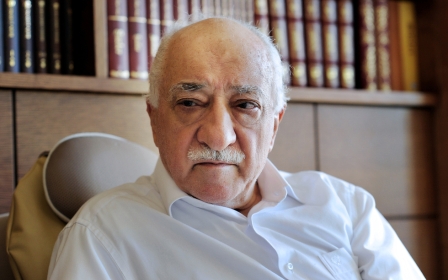$266k offered for Erdogan FaceTime iPhone used during coup attempt

Offers have been pouring in from Saudi Arabia and Gulf states for the iPhone used to connect to the Turkish president while last week's attempted coup was underway, the phone’s owner has said.
Hande Firat, the Ankara bureau chief at CNN-Turk, used her personal iPhone to connect to Recep Tayyip Erdogan while the attempted coup was underway during the early hours of Saturday morning.
Prior to Erdogan's appearance on TV as he and Firat used FaceTime, the location and status of Erdogan was unknown. Rumours on social media at the time suggested he was on his way to Germany to seek asylum.
“I have received numerous messages of congratulations and also many offers to buy that phone from Saudis and people in other Gulf states,” Firat told the Turkish Hurriyet newspaper.
She said she had spoken twice to Erdogan’s private secretary before the FaceTime conversation that was aired live.
“He wanted it done via Skype but that was installed on another phone. I only had FaceTime and told him, 'Please, let’s do it on this,'” she said.
She said more than an hour passed between her first conversation with the secretary and getting Erdogan live on air.
“When I called for the second time, he said we did something on Periscope. I said that is pointless. I am here live in the studio. Connect him to me."
She said she has received multiple offers for the phone; some even offering $250,000. But she said she hasn’t responded to any of those messages.
One Saudi businessmen said on Twitter that he would offer 1 million Saudi riyals ($266,000) for the phone.
“This iPhone has saved a whole nation [Turks] and prevented bloodbaths," said the Saudi businessman, who called himself Abu Rakan on his Twitter handle.
"I will purchase it and have it on display at the Saudi national museum for Arabs to learn the repercussions of revolutions and battles.”
Some have noted the irony that Erdogan - who during the height of the 2013 Gezi Park protests calling Twitter “the worst menace to society" - may have saved his position through the use of social media, despite repeated bans on various online platforms.
"The role of internet and press freedoms in defeating the coup presents a significant opportunity," wrote Zeynep Tufekci in the New York Times on Monday. "Rather than further polarisation and painting of all dissent as illegitimate, the government should embrace real reforms and reverse its censorship policies."
"A free press and open internet have proved essential to everyone — even those at the height of power."
Following the failed coup attempt, the Turkish government has launched a mass crackdown on what they allege to be sympathisers of the US-based cleric Fethullah Gulen, whom it blames for the attempted takeover.
Turkey's justice ministry on Wednesday released a list of 99 generals and admirals charged in connection with the coup, representing about a third of the military's top brass.
The defence ministry also said it had launched investigations into every single military judge and prosecutor in Turkey.
A total of 262 military judges and prosecutors have already been removed as part the investigation, it said.
The country's higher education board meanwhile banned all academics from foreign travel. It announced 6,538 state workers had been suspended on Wednesday, bringing total suspensions to more than 20,000.
The education ministry launched action to shut 524 schools, for "engaging in acts that threaten the constitutional order".
More than 20,000 private teachers have also had their licences revoked.
Middle East Eye propose une couverture et une analyse indépendantes et incomparables du Moyen-Orient, de l’Afrique du Nord et d’autres régions du monde. Pour en savoir plus sur la reprise de ce contenu et les frais qui s’appliquent, veuillez remplir ce formulaire [en anglais]. Pour en savoir plus sur MEE, cliquez ici [en anglais].




